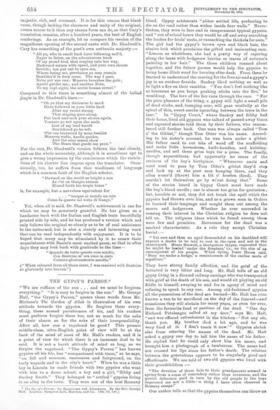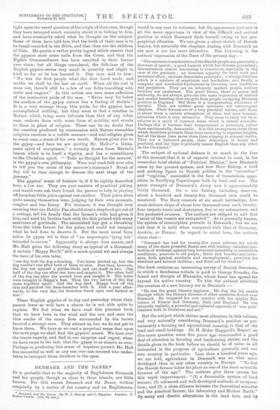THE GYPSY'S FAISON.* " WE are ruffians of the sun .
. • and we must be forgiven everything." "It is easy to forgive in the sun." Mr. George Hall, " the Gypsy's Parson," quotes these words from Mr. Hichens's The Garden of Allah in illustration of his own attitude towards the gypsies. He forgives them every- thing, these nomad parishioners of his, and his readers must perforce forgive them too, not so much for the sake of their charm as for the sake of their irresponsibility. After all, how can a vagabond be good ? This prosaic aniddle-class, ultra-English point of view will be at the back of the mind of moat of Mr. Hall's readers, and it is a point of view for which there is an immense deal to be said. It is not a harsh attitude of mind so long as we forgive the vagabond. " The Gypsy's Parson " has known gypsies all his life, has "companioned with them," as he says, " on fell and common, racecourse and fairground, on the turfy wayside and in tire city's heart." When he was a little boy in Lincoln he made friends with two gypsies who went with him to a dame school, a boy and a girl, "Sibby and Smiley Smith." They belonged to " settled " gypsies living in an alley in the town. They were not of the best Romany * Tho l'argen.: Ms Eaporio:eas (raid Adventures. By the ROY. George Hall. London: Sampson Low, Marston, and Co- Des. ed, net.] blood. Gypsy aristocrats "abhor settled life, preferring to die on the road rather than wither inside four walls." Never- timeless, they were in face and in temperament typical gypsies, and " out of school hours they would be off and away searching the bushes for birds' nests, or ransacking the thickets for nuts." The girl had the gypsy's brown eyes and black hair, the elusive look which proclaims the gifted and insinuating race. "Lissom as whalebone, she had a pretty way of capering along the lanes with hedgerow berries or leaves of autumn's painting in her hair." The three children roamed about together, and the future parson would help the gypsies to bring home illicit wood for burning after dusk. From them he learned to understand the craving for the free air and a gypsy's joy in an outdoor fireside. Snakey liked nothing so well as to light a fire on their rambles. "You don't feel nothing like so lonesome as you keeps pushing sticks into the fire," he would say. The love of the fire runs through the race. " For the pure pleasure of the thing, a gypsy will light a small pile of dead sticks, and, lounging near, will gaze wistfully at the spiral of thin, sweet smoke upcurling between the trees in the lane." In "Gypsy Court," where Snakey and Sibby had their home, lived old gypsies who talked of passed-away times and repeated stories told them by their fathers, who remem- bered still further back. One man was always called "Tom o' the Gibbet," though Tom Otter was his name. Accord- ing to his sister's account, he was born under a gibbet. His father used to cut bits of wood off the scaffolding and make little horseshoes, knife-handles, and knitting- needles, and sell these grim toys for a price. The family, though superstitious, had apparently no sense of the eeriness of the boy's birthplace. 'Whenever uncle and aunt used to pass by Tom Otter's gibbet they'd stop and look up at the poor man banging there, and they aline wsrser'd (threw) him a bit o' hautben (food). They couldn't let theirselves go by wi'out doing that." Some of the stories heard in Gypsy Court must have made the boy's blood curdle ; one is almost too grim for quotation; hut, horrible or not, they did not break the spell which the gypsies had thrown over him, and as a grown man in Orders he learned their language and sought them out among the moors and hedgerows. Whether he ever succeeded in rousing their interest in the Christian religion he does not tell us. The religions ideas which he found among them were few and primitive. Reverence for the dead was a marked characteristic. As a rule they accept Christian burial :— "Yet now and then an aged lkmanitsha on his deathbed will express a (leave to be laid to rest in the open and not in the churchyard. Moses Boswell, a Derbyshire Gypsy, requested that he might be buried under the fireplace,' i.e., on the site of an encampment of his people. When dying, Isaac Heron said, `Bury me under a hedge,' a reminiscence of the earlier mode of sepulture."
They have strong family affection, and the grief of the bereaved is very bitter and long. Mr. Hall tells of an old gypsy living in a disused railway carriage who was transported with grief at the death of his son, and would sit playing an old fiddle to himself, swaying to and fro in agony of mind and refusing to speak to any one. Among old-fashioned gypsies all the possessions of the dead are burned—Mr. Hall has even known a van to be sacrificed on the day of the funeral—and sometimes they will abstain for many years, or even for ever, from the favourite food or pastime of the dead. "One day. Richard Petulengro called at my door," says Mr. Hall, "and was offered refreshment in the kitchen—' Not any ale, thank you. My brother died a bit ago, and he was wery fond of it. I don't touch it now.'" Gypsies shrink also from uttering the names of the dead. Mr. Halt asked a gypsy one day to tell him the name of his father. He replied that he could only show him his name, and brought him a photograph of a tombstone. The name had not crossed his lips since his father's death. The relation between the generations appears to be singularly good and affectionate. Wo aro told of two old gypsies who lived witk their grandchildren :— "The devotion of those lads to their grandparents seemed to spring from a sense of comradery rather than reverence, and the quaint deforonee paid in turn by the old people to the boys impressed me not a little---a thing I have often observed ix Romany camps."
Our author tells us that the gypsies themselves can throw ne light upon the vexed question of the origin of their race, though they have betrayed much curiosity about it in talking to him, and have constantly asked what he thought on the subject. Some of them have told him that the birth of their race is to be found recorded in the Bible, and that they are the children of Cain. He quotes a rather pretty legend which asserts that the gypsies stole some nails from the Cross, and that the Eighth Commandment has been remitted in their favour ever since ; but all things considered, the folk-lore of the English gypsies seems very email in quantity and slight in kind so far as he has learned it, One man said to him : " We was the first people what the dear Lord made, and mebbe we shall be the last on earth. When all the rest is wore out, there'll still be a few of our folks travelling with tents and wagons." In this notion one sees some reflection of the instinctive pride of the race. " Never very far below the surface of the gypsy nature lies a feeling of disdain." It is a very strange thing, this pride, for the gypsies have accomplished nothing; but they seem to feel a relation to Nature which, being more intimate than that of any other race, endows them with some form of nobility, and stands to them in place of religion. There can be no doubt that the emotion produced by communion with Nature resembles religious emotion in a subtle manner—and real religion gives to every man a sense of his own worth. Nature gives also to the gypsy—and here we are quoting Mr. Hall—" a blithe- some spirit of acceptance," a serenity drawn from Nature's bosom which is in itself a dignity, and has a resemblance to the Christian spirit. "' Take no thought for the morrow,' is the gypsy's own philosophy. Were real road-folk ever able to tell you the route of the morrow's itinerary P Break of day will be time enough to discuss the next stage of the journey."
The gypsies' sense of humour is, if it be rightly described here, a low one. They are past-masters of practical joking, and would even ask their friend the parson to help in playing off harmless little jokes against one another. Their jokes when quite among themselves were, judging by their own accounts, rougher and less funny. For instance, it was thought very amusing that one Bobbie Faa should steal a. shepherd-pie out of a cottage, tell his family that the farmer's wife had given it him, and send his brother back with the dish primed with many sentences of gratitude. The astonished boy got a thrashing from the irate farmer for his pains, and could not imagine what he had done to deserve it. But the most usual form taken by gypsy wit is that of "an impromptu 'lying tale' intended to amuse." Apparently it always does amuse, and Mr. Hall gives the following story as typical of a thousand. A certain "Happy Boz'll," still a much-quoted wit and always the hero of his own tales, "one day took his dog a-hunting. Two hares started up, but the dog couldn't run after both of thorn at once. Just then, however, the dog ran against a scythe-blade and cut itself in two. One half of the dog ran after one hare and caught it. The ether half of the dog ran after the second hare and caught it. The hares were brought to Happy'a feet. Then the two halves of the dog came together again. And the dog died. Happy took off the skin and patched his knee-breeches with it. Just a year after- wards, to the very day, his breeches burst open and barked at him,"
These English gypsies of to-day and yesterday whom their parson loves so well have a charm he is not able quite to explain. We feel when we have read this pleasant book that we have been in the wind and the sun and seen the blue smoke of the clamp fires surrounded by the brown faces of a strange race. They attract us, but we do not get to know them. We have as we read a perpetual sense that upon the next page we shall find the gypsies' secret. We turn over the leaves eagerly, and find to our surprise and regret, when 'we have come to the last, that the gypsy is as elusive as ever. Perhaps in producing this sense of hopeless pursuit Mr. Hall has succeeded as well as any one over can succeed who under- takes to interpret these dwellers in the open.















































 Previous page
Previous page